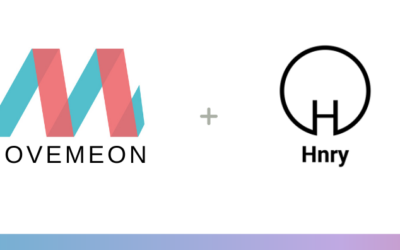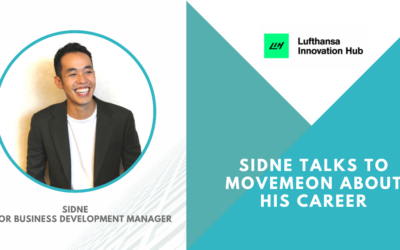Robert Stevenson, the COO of Techspace shares his career journey with Movemeon.
Interested in working at Techspace? Click here to view live roles
—
Please tell us a bit about your background and career.
It’s quite a funny story actually. Like a lot of my peers at university, I didn’t have a very clear direction or thought process on a strategic direction for my career, but from a very young age, I was always told that I’d make a good lawyer. I didn’t really know what a lawyer actually did, and I don’t think the people telling me knew either… But I still decided to go in that direction.
In the UK, law firms try to get you while you are young, so you have recruitment fairs in the second year of university. So in my second year I signed up for vacation schemes at a number of big law firms in London, and one of them offered me a scheme that took the whole summer (because they didn’t want you to go to another firm!) – half of it was in London, and for the second half they shipped me off to New York, so I lived in New York for a number of weeks. At the end of it, I got a job offer, so here I was, at the age of 20, with 2 more years of university still to go (I was doing a 4-year degree), and a job lined up that was even going to pay for law school. For a 20-year-old, it was just great!

I didn’t really think about whether I’d like the nuts and bolts of it, but once I was doing it, I could tell I didn’t want to be a lawyer long-term. A lot of my friends were going into other professional services though, so I felt that law was just as good a background skill to have. In retrospect, I was actually quite lucky. I graduated right at the start of GFC, so all the finance jobs disappeared overnight! A lot of my friends who would have gone into finance ended up going into graduate schemes or corporates.
Anyway, I knew that the advisory work I did as a lawyer was interesting and challenging, but I wanted to operate a business. I wanted to be the decision-maker, and to build a business — but I didn’t really want to build a law firm, I wanted to build a business where I wasn’t the product.
To help with moving to a more general business career, I made sure my legal specialisms were as relevant as possible: I did corporate and commercial legal work with a focus on M&A. That was a really transferable skill set, and the business contacts I made were also relevant to my future that way. So tailoring my career to my plans for the future was great, but then there was this scary moment where I realised I’d done law for 5 years! In law, in the UK you get pigeonholed very easily, while in the US it’s very easy to have a business career after being a lawyer. That was very different from my friends who’d done, for example, accountancy, and were gradually moving over into operational roles. This was a bit concerning for me, so I started to think more consciously about how to navigate the change.

The few options I came up with included: moving over to business/management consultancy; doing an MBA, which basically washes your slate clean; or starting my own business. I spoke to a lot of my friends at the time, including Rich [Movemeon co-Founder and one of Rob’s university friends]. Rich was always very clear, he’d basically say to just get a job and figure it out as you go. I’d also spoken to a few management consultant friends. I remember one of them particularly, who was at Bain, said I’d be crazy to go from law to management consultancy as I’d end up with the same problem — after 5 years, I’d have (another) great brand on my CV, but I still wouldn’t have any operational experience. So I narrowed it down to trying to run my own business or doing an MBA. The latter was knocked off the list based on cost.

I had some medic friends and we decided to try and set up a telemedicine business. But what really helped me make the leap was that Rich took a bet on me at the same time. He asked me to join him and Nick at Movemeon; he gave me an entry-level job doing growth. I was working with them in the very early days of Movemeon, helping to grow out both sides of the platform, and helping them with their website redesign. Doing this really helped me to get in and do sales / prospecting work – it’s the kind of thing everyone hates, but it’s actually really important to do. I worked with them for 6 months, and at the same time, we launched the telemedicine business. At the same time, I also knew I wouldn’t be working with Rich forever, so I also joined two other lawyers setting up a firm helping early-stage companies exclusively.
The telemedicine business did OK, but it was never enough of a success to pay the bills. The law firm was wildly successful, but I was again becoming a lawyer, and I did not want to be one. However, through the firm, I met the guys starting Techspace. With Techspace, I learnt more about the business model. Rich and I had worked in a number of shared working spaces and business lounges, including Regus [now IWG], WeWork and Workspace, and I thought this market was really interesting. It was fast-growing, with a fairly simple business model (albeit with some risk attached). I also liked the focus of going after scaling technology companies as your customer base, as it was a really robust and growing market — growing markets are so much more forgiving than mature or stable ones!

When I met the Techspace guys, I thought this was a really interesting opportunity. They were just growing their team, and I helped them raise a round of financing – their series A – and after that stayed involved as their financial and legal advisor. Over the following year, I got more and more involved, and eventually, they asked me to come on full-time. I initially joined in a strategy / commercial role, and just under 2 years ago there were some changes in the management team, and the shareholders at the time asked me to take over as MD. I helped run the business and raised some more capital, and then hired a new CEO. I thought he was going to bring his own executive team, but we got on really well so he asked me to stay on as his COO — I took over formally in April. (It was definitely a crazy time to start as official COO, with a lot of challenges brought by COVID.)
What is your day-to-day like at Techspace now, especially in light of COVID?
For a start, it’s not as organised as I’d like it to be! I like to be organised about the way I stay on top of operational and commercial responsibilities, but we are quite reactive at the moment. Guidance is changing a lot, so operating approaches need to change in response.
Broadly speaking, my operational objectives right now are to keep our sites operational and safe for any of their members who do want to or need to work from their offices. It’s simple once you get the hang of it, but it does require understanding who is coming in and out of our buildings, and making sure our cleaning regimes are up to scratch.

My next set of responsibilities include thinking c. 6 months down the track, and trying to decide what our buildings are going to look like as demand increases for them. Before we’ve sold the COVID crisis, this also means thinking about how we solve operating constraints while utilisation of our buildings increases.
Looking back, when I took over in April, the single biggest issue was thinking about how we reduce all of our variable costs. That was a massive re-forecasting exercise with tons of conversations with our suppliers and partners — some of these were very difficult, but broadly speaking it’s been a very supportive environment. We are very lucky about that.
Looking beyond the next 4-6 months, it’s going to be a lot about retraining our team (unfortunately we had to lose some team members), and updating our SOPs to be as efficient as possible while delivering good member service. We also want to make sure we have good learnings from all of our sites, since we operate in both London and Berlin. It’s my responsibility to make sure we learn from each other.
Day-to-day, fundraising and working with our shareholders is also in my portfolio. It’s pretty varied – we are still fairly small, so you have to do lots.
As someone with a lot of insight into co-working space use, what are your predictions for the ‘future normal’ when it comes to work?
I think where we’ll ultimately end up – and this will take a while – is a kind of blended approach, with some remote working and some co-working space use. The latter will mean that people can still have a community and a social network; for most people working really from home is not actually a nice idea. Having no one else around works for a small segment of society, but the majority will probably want local hubs. But I can also see companies wanting to have a base where they can get the team together, to have central meetings and socialise. But this change will take at least 10 years, with local hubs and housing outside of London needing to be built.

Do you have any advice for others hoping to move from professional services to startups, or hoping to change career in general?
Talk to lots of people. Consultants and lawyers are ‘solutionisers’ – we feel nervous when we don’t have the answer. But most people are more than happy to answer questions, so it’s OK to be vulnerable. Pick career role models, and talk to them.
It’s also important to give yourself the chance to have an idea about the direction you are taking, but it’s OK to have to course-correct over time. Be deliberate about the people you are working with – your team will have much more of an impact on you than your company.
Get used to living within your means, especially if you are hoping to move to a startup. Coming from professional services, you won’t be paid as much as you are used to in a startup, and if you are not living within your means you’ll never have the confidence to make the change.
Once you are in the right industry/company, it’s also just as important to put the time in to regularly reflect on whether your trajectory still meets your needs. People’s circumstances change, so it’s key to keep coming back to what’s important to you.
Click here for more insight into other organisations hiring on Movemeon.com


